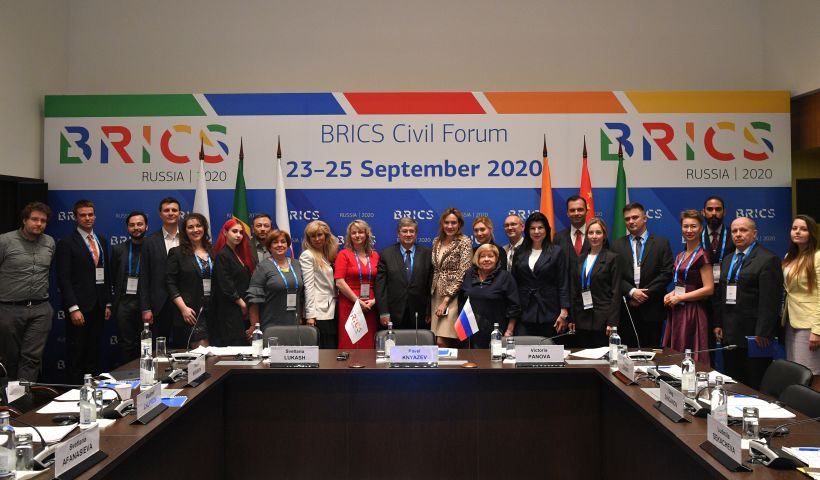On 25 September, BRICS Civil Forum 2020 concluded in Moscow. During the three days of the Forum, over 450 members of civil society institutions, experts, researchers and journalists took part in the events in both online and offline formats.
The forum’s programme featured ten thematic sessions in Food and Healthcare; Education and Science; Economic Development in the Digital Era; Information Strategies and Society; Environment, Climate and Energy; Sustainable Cities and Rural Development; Women and Girls; and People-to-People Exchanges.
The closing session was moderated by Victoria Panova, co-chair of the BRICS Civil Forum, Managing Director of the National Committee on BRICS Research, Scientific Supervisor of the BRICS Russia Expert Council, and Vice-President for International Relations of the Far Eastern Federal University.
“Initiatives in three pillars of BRICS cooperation – political, economic and humanitarian – are aimed at boosting living standards and the quality of life of the peoples of the five BRICS countries. This is a paramount task both for Russia’s BRICS Chairmanship this year and for the group’s entire multifaceted strategic partnership. The Forum has once again clearly demonstrated that civil organisations in the five countries are proactive and committed to constructive and mutually complementary cooperation. BRICS Civil Forum 2020 has proven the format’s great value as an efficient and appealing platform for the five states’ cooperation, which is particularly relevant as it was initiated by our country during its previous chairmanship in 2015”, said Pavel Knyazev, Russia's BRICS Sous-Sherpa and Deputy Director of the Russian Foreign Ministry's Foreign Policy Planning Department.
“In 2013, the year of Russia’s G20 Presidency, we launched a transparent and highly efficient civil process that has been replicated by the countries presiding in G20 since then. What has taken place in the BRICS format since 2015 is also a highly engaging and open process that should be developed further. In my opinion, recommendations by the BRICS Civil Forum’s Environment, Climate and Energy Working Group are even more ambitious than those made by the Civil G20 in certain areas this year, which is a surprising and very positive outcome. Immense work has been done in other areas as well, in particular, on women’s issues as well as the work of the Healthcare Working Group. As official representatives, we should base our efforts on your ideas – this is the purpose of our work. These interaction formats exist to improve people’s lives in all areas. Without the contribution of civil society, meetings at the level of heads of state would be pointless”, Svetlana Lukash, Deputy Chief of the Presidential Experts' Directorate noted.
The Forum’s outcomes included a set of recommendations developed by BRICS civil society for the five countries’ governments, as well as a concluding document, the Address by BRICS States’ Civil Society to the Countries’ Leaders.
“Today, we are handing over the Civil BRICS Forum’s recommendations to the offices of BRICS and G20 sherpas. These recommendations will ensure the successful completion of the Russian BRICS Chairmanship in 2020 and help the five countries to make a confident step towards the new five-year period. The ideas voiced by our civil society have received broad support from our BRICS colleagues as well as from participants from a number of countries in Europe and Asia. I believe that we have held a comprehensive exchange of opinions that will prove useful to people worldwide,” Victoria Panova emphasised.
